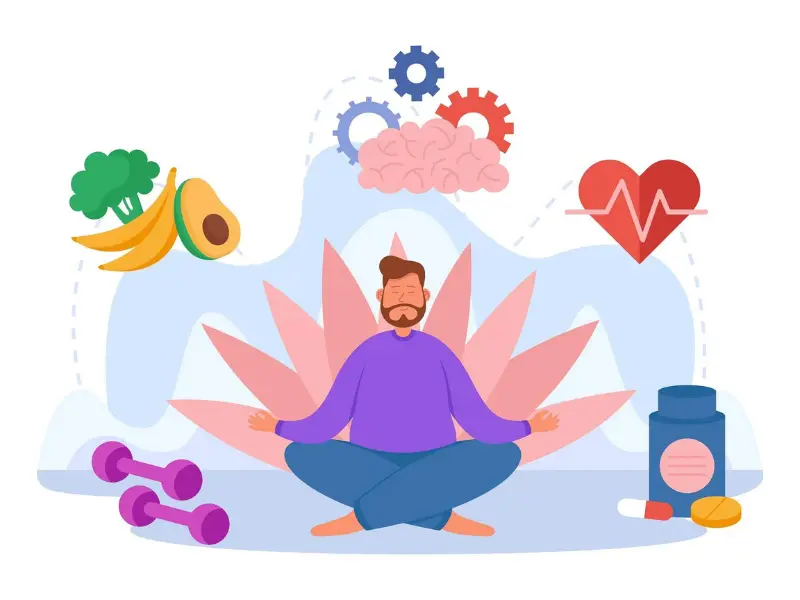The relationship between physical & mental health is critical to our overall well-being. Our physical health does not solely determine our quality of life but is also influenced by our emotional and social well-being. Research has shown that individuals who engage in regular physical activity have better mental health outcomes, such as reduced stress and anxiety.
Psychological Disorders impacting the Physical Health
Common psychological disorders can seriously impact not only the mental health but also the physical health of an individual.
- Anxiety: Anxiety can have various physical effects on the body, such as increased heart rate, rapid breathing, sweating, muscle tension, and digestive issues. Chronic anxiety can also weaken the immune system & pose a higher risk of developing conditions like high blood pressure, heart disease, and diabetes.
- Depression: Depression can also impact physical health in several ways. It can lead to fatigue, changes in appetite and sleep patterns, headaches, body aches, and chronic pain. In severe cases, depression may increase the chances of heart disease, stroke, and other medical conditions. Additionally, depression can make maintaining healthy habits like exercise challenging, further exacerbating physical health issues.
Relation between Physical and Mental Health
It's commonly known that physical health issues such as pain and chronic diseases can increase the risk of mental health issues like anxiety and depression. However, it's not always the case that physical health problems cause mental health issues, and research has shown that psychological factors may more likely cause chronic pain than physical ones.
This means that how we think and feel can significantly affect how we experience pain. For example, someone experiencing chronic pain may also be dealing with anxiety, depression, or other mental health issues that can make the pain worse or more challenging to manage. Understanding the relationship between physical and psychological health is essential because it highlights the need for a holistic approach to healthcare.
Improving mental and physical fitness through:
- Healthy lifestyle: Regular physical activity, maintaining a well-maintained diet, getting enough sleep, and avoiding harmful substances like drugs and alcohol can improve mental health by reducing stress, improving mood, and increasing self-esteem.
- Being more aware of your emotions: Practicing mindfulness, journaling, or talking to a therapist can help you become more aware of your feelings, which can lead to better emotional regulation and reduce the risk of developing mental health issues like anxiety and depression.
- Develop healthy social bonds: Building and maintaining healthy relationships with friends, family, and community can help reduce loneliness and improve social support, which can improve mental health outcomes and reduce the risk of developing mental health issues.
- Having a positive outlook towards life: Cultivating a positive mindset, practicing gratitude, and focusing on the good things in life can help improve mental health outcomes by reducing negative self-talk, promoting self-acceptance, and improving overall life satisfaction.
Conclusion
Taking care of your physical health is crucial to achieving perfect mental health. Specific steps and regular workouts can help you prevent common mental health disorders.
If you're struggling with mental disorders and want a way out, get connected with Solh Wellness. We have personalized Allied Therapies like Sports and Art Therapy that'll help you overcome mental disorders holistically. Download the Solh Wellness App and take a step[ towards your better mental health and better life.



